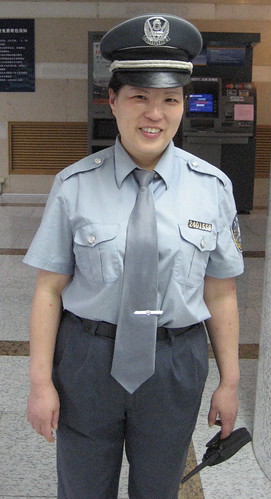
Security guard at Shanghai Public library (a very nice lady)
One thing I’ve been noticing a lot (I’m in Shanghai) is that China may be the best-guarded society in the world. There are guards everywhere. By guards I mean people in uniform who don’t seem to have much to do. At the top you have people who guard Chairman Mao, i.e. real military types. Then regular cops. Then those traffic police in grubby yellow vests whose work seems to be mostly harassing bike riders. Then you have huge, unending masses of security guards.1 Guards at libraries and archives. Guards at the gate to any sort of courtyard or parking area who sit in a little glass box and wave at you as you go by. Guards at stores and shopping centers and hotels. People who are wearing guard-type uniforms, but it is not really clear what they are guarding. The lower down you go the more ill-fitting the uniform seems to be, and the less likely it seems that the person is going to stop anybody from doing anything.
So why are they all there? Are they really afraid somebody is going to walk out of the library with a book? Some are universal and need little explanation. All modern states seem to want cops. And they all seem to want military guys at the appropriate places. The guy in the little box is a figurative (and possibly literal) descendant of the guards at the entrance to the compound of a work unit (单位). They used to be there to mark out the territory of the unit and to make you get off your bike as you came in the gate as a sign of respect. (Respect for what I’m not sure. Mostly the guards it seemed.) Today China does not have a system of space that is quite as delimited as that, but guards are still around. Why? Well part of it is no doubt that it is cheap to hire people to do stuff like this, and so you don’t need much of a reason. In more developed countries a human security guard is a pretty huge investment. In China it is cheap, especially if they have no special training, which seems to often be the case. They also do serve in a way to delimit space just like the old danwei guards did. There is an awful lot of disorder (乱) in China. If you are not careful street hawkers, homeless people and counter-revolutionary elements may set up shop in “your” space. So any government office or private entity that can afford it will hire some guards. It is sort of interesting to figure out what rules they are enforcing. As an American I am used to fairly distinct lines between public and private property, and clear rules about what I can and can’t do. Here of course things are different, and guards enforce whatever rules seem appropriate and in very different ways to different people. I can take a nap on a bench. A beggar can’t. This space that looks public actually belongs to us (look, we are guarding it.) All of them seem to be enforcing a certain amount of civility on the people who need it enforced on them. Best of all, from the state’s point of view most of them do it without being paid by the state. Zwia Lipkin wrote about some of these issues in the Nationalist period.
All of these security guards are completely unarmed. I don’t want to be all American and insist that you can’t be a guard without a gun, but at least a billy club would be something. ↩
Actually, this is exactly my experience in Indonesia as well, but as proof that it is the price of labor, whenever I went into any department store there would be about 100 young Indonesian women per square meter versus 0.0001 in the ones here. It was more than a little disconcerting to be there at check out time for the employees as they all group around the clock and have nothing to do but stare at the bumbling foreigner as he tries futilely to hide behind a clothes rack.